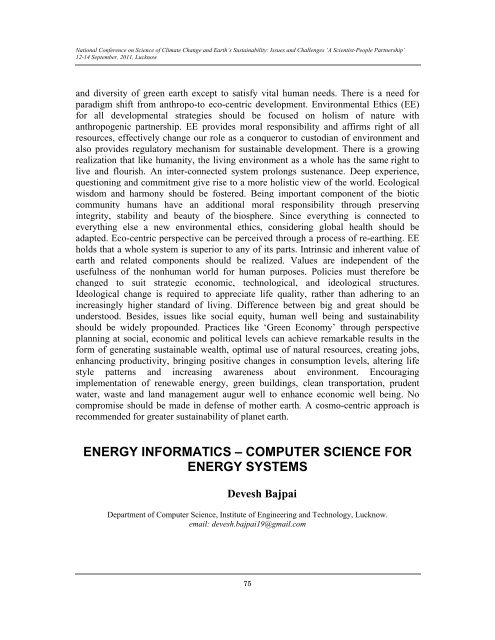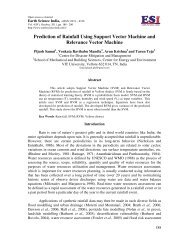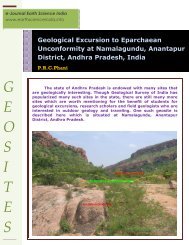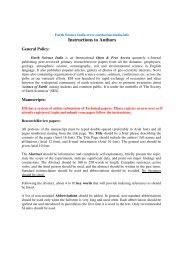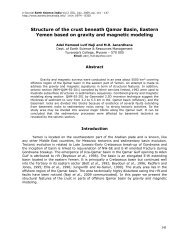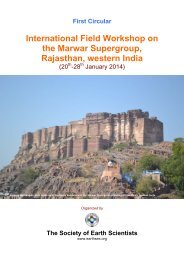12-14 September, 2011, Lucknow - Earth Science India
12-14 September, 2011, Lucknow - Earth Science India
12-14 September, 2011, Lucknow - Earth Science India
You also want an ePaper? Increase the reach of your titles
YUMPU automatically turns print PDFs into web optimized ePapers that Google loves.
National Conference on <strong>Science</strong> of Climate Change and <strong>Earth</strong>’s Sustainability: Issues and Challenges ‘A Scientist-People Partnership’<br />
<strong>12</strong>-<strong>14</strong> <strong>September</strong>, <strong>2011</strong>, <strong>Lucknow</strong><br />
and diversity of green earth except to satisfy vital human needs. There is a need for<br />
paradigm shift from anthropo-to eco-centric development. Environmental Ethics (EE)<br />
for all developmental strategies should be focused on holism of nature with<br />
anthropogenic partnership. EE provides moral responsibility and affirms right of all<br />
resources, effectively change our role as a conqueror to custodian of environment and<br />
also provides regulatory mechanism for sustainable development. There is a growing<br />
realization that like humanity, the living environment as a whole has the same right to<br />
live and flourish. An inter-connected system prolongs sustenance. Deep experience,<br />
questioning and commitment give rise to a more holistic view of the world. Ecological<br />
wisdom and harmony should be fostered. Being important component of the biotic<br />
community humans have an additional moral responsibility through preserving<br />
integrity, stability and beauty of the biosphere. Since everything is connected to<br />
everything else a new environmental ethics, considering global health should be<br />
adapted. Eco-centric perspective can be perceived through a process of re-earthing. EE<br />
holds that a whole system is superior to any of its parts. Intrinsic and inherent value of<br />
earth and related components should be realized. Values are independent of the<br />
usefulness of the nonhuman world for human purposes. Policies must therefore be<br />
changed to suit strategic economic, technological, and ideological structures.<br />
Ideological change is required to appreciate life quality, rather than adhering to an<br />
increasingly higher standard of living. Difference between big and great should be<br />
understood. Besides, issues like social equity, human well being and sustainability<br />
should be widely propounded. Practices like ‘Green Economy’ through perspective<br />
planning at social, economic and political levels can achieve remarkable results in the<br />
form of generating sustainable wealth, optimal use of natural resources, creating jobs,<br />
enhancing productivity, bringing positive changes in consumption levels, altering life<br />
style patterns and increasing awareness about environment. Encouraging<br />
implementation of renewable energy, green buildings, clean transportation, prudent<br />
water, waste and land management augur well to enhance economic well being. No<br />
compromise should be made in defense of mother earth. A cosmo-centric approach is<br />
recommended for greater sustainability of planet earth.<br />
ENERGY INFORMATICS – COMPUTER SCIENCE FOR<br />
ENERGY SYSTEMS<br />
Devesh Bajpai<br />
Department of Computer <strong>Science</strong>, Institute of Engineering and Technology, <strong>Lucknow</strong>.<br />
email: devesh.bajpai19@gmail.com<br />
75


